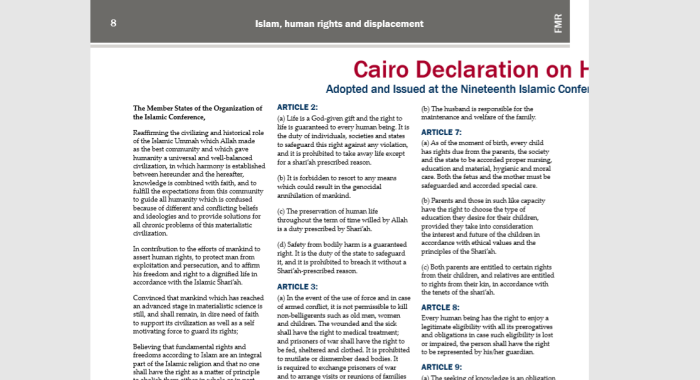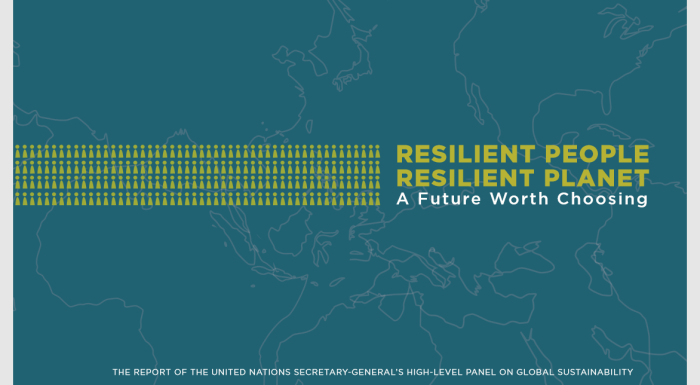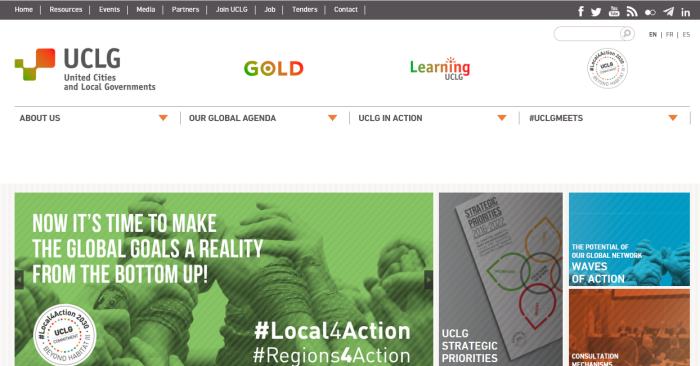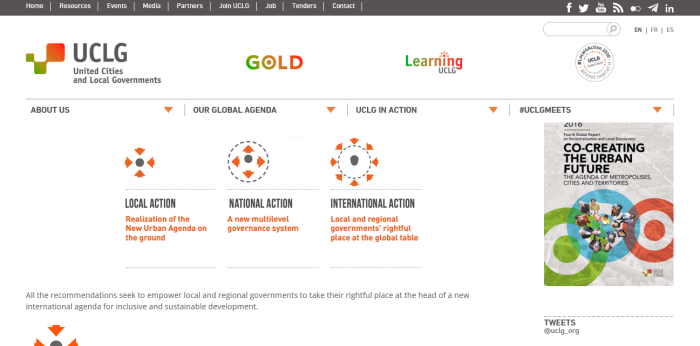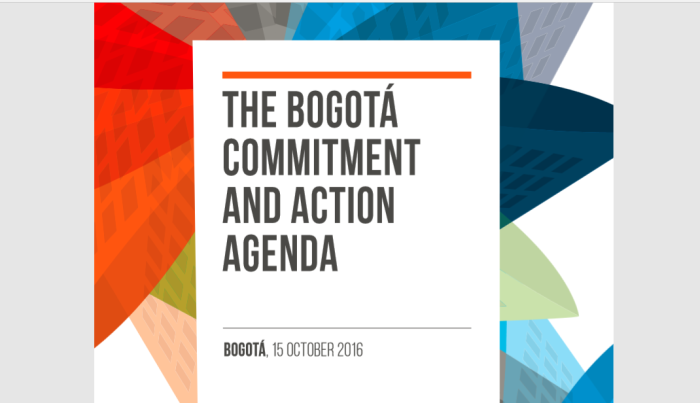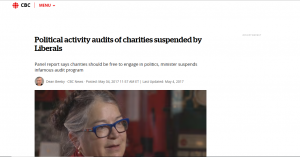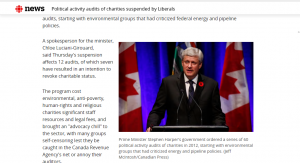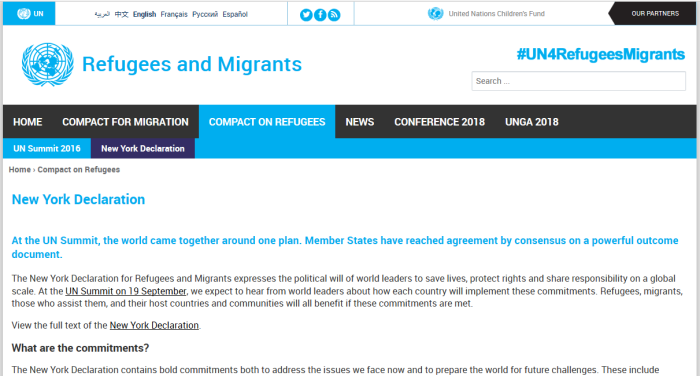
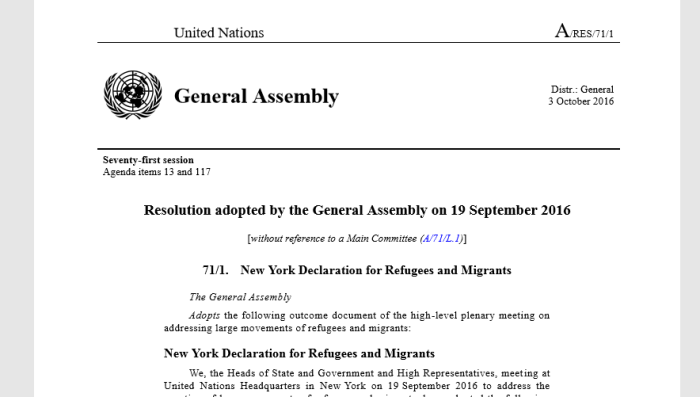
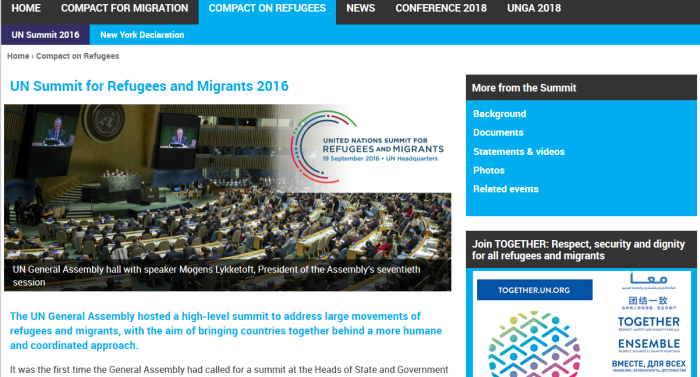
1. Important Links
(1) https://refugeesmigrants.un.org/migration-compact
(2) https://refugeesmigrants.un.org/declaration
(3) https://www.un.org/en/ga/search/view_doc.asp?symbol=A/RES/71/1
(4) https://www.un.org/pga/72/wp-content/uploads/sites/51/2018/07/migration.pdf
2. The Timeline
- September, 2016, New York Declaration agreed to.
- July 2018, Text of Global Migration Compact agreed to
- December 2018, formal siging ceremony for Global Migration Compact
To give some context, this conference in New York happened TWO YEARS before the signing. And comparing the NY Declaration to the Compact text, it seems that the opinions didn’t change much along the way.
3. Summary Of NY Declaration
Note: for ease of comparison, the points are numbered, although not done so in the actual text.
What are the commitments?
The New York Declaration contains bold commitments both to address the issues we face now and to prepare the world for future challenges. These include commitments to:
- Protect the human rights of all refugees and migrants, regardless of status. This includes the rights of women and girls and promoting their full, equal and meaningful participation in finding solutions.
- Ensure that all refugee and migrant children are receiving education within a few months of arrival.
- Prevent and respond to sexual and gender-based violence.
- Support those countries rescuing, receiving and hosting large numbers of refugees and migrants.
- Work towards ending the practice of detaining children for the purposes of determining their migration status.
- Strongly condemn xenophobia against refugees and migrants and support a global campaign to counter it.
- Strengthen the positive contributions made by migrants to economic and social development in their host countries.
- Improve the delivery of humanitarian and development assistance to those countries most affected, including through innovative multilateral financial solutions, with the goal of closing all funding gaps.
- Implement a comprehensive refugee response, based on a new framework that sets out the responsibility of Member States, civil society partners and the UN system, whenever there is a large movement of refugees or a protracted refugee situation.
- Find new homes for all refugees identified by UNHCR as needing resettlement; and expand the opportunities for refugees to relocate to other countries through, for example, labour mobility or education schemes.
- Strengthen the global governance of migration by bringing the International Organization for Migration into the UN system.
What will happen next?
The New York Declaration also contains concrete plans for how to build on these commitments:
Start negotiations leading to an international conference and the adoption of a global compact for safe, orderly and regular migration in 2018. The agreement to move toward this comprehensive framework is a momentous one. It means that migration, like other areas of international relations, will be guided by a set of common principles and approaches.
Develop guidelines on the treatment of migrants in vulnerable situations. These guidelines will be particularly important for the increasing number of unaccompanied children on the move.
Achieve a more equitable sharing of the burden and responsibility for hosting and supporting the world’s refugees by adopting a global compact on refugees in 2018.
4. Contrast NY Declaration, UNGMC
The Global Migration Compact consists of 23 “non-binding” objectives, which align almost perfectly with the original declaration
Protect the human rights of all refugees and migrants, regardless of status. This includes the rights of women and girls and promoting their full, equal and meaningful participation in finding solutions.
Gender will be mentioned throughout the document.
Ensure that all refugee and migrant children are receiving education within a few months of arrival.
.
(Objective, 15(f)) Provide inclusive and equitable quality education to migrant children and youth, as well as facilitate access to lifelong learning opportunities , including by strengthening the capacities of education systems and by facilitating non-discriminatory access to early childhood development, formal schooling, non-formal education programmes for children for whom the formal system is inaccessible, on-the-job and vocational training, technical education, and language training, as well as by fostering partnerships with all stakeholders that can support this endeavour
Prevent and respond to sexual and gender-based violence.
Of course, there is the “elephant in the room”. If sexual and gender based violence is anticipated to be such a big problem, “why” are we letting large numbers of these people into our countries?
Support those countries rescuing, receiving and hosting large numbers of refugees and migrants.
.
We commit to cooperate internationally to save lives and prevent migrant deaths and injuries through individual or joint search and rescue operations, standardized collection and exchange of relevant information, assuming collective responsibility to preserve the lives of all migrants, in accordance with international law. We further commit to identify those who have died or gone missing, and to facilitate communication with affected families.
Notice, they blur the line between:
(a) Migrant and refugee, and
(b) Legal and illegal
Work towards ending the practice of detaining children for the purposes of determining their migration status.
.
(Objective 13) We commit to ensure that any detention in the context of international migration follows due process, is non-arbitrary, based on law, necessity, proportionality and individual assessments, is carried out by authorized officials, and for the shortest possible period of time, irrespective of whether detention occurs at the moment of entry, in transit, or proceedings of return, and regardless of the type of place where the detention occurs. We further commit to prioritize noncustodial alternatives to detention that are in line with international law, and to take a human rights-based approach to any detention of migrants, using detention as a measure of last resort only.
That’s right. Avoid detention of illegals if at all possible. Release them into the community wherever possible. Just because they are in the country illegally, that doesn’t mean they are breaking the law apparently.
Strongly condemn xenophobia against refugees and migrants and support a global campaign to counter it.
.
(Objective 17) Promote independent, objective and quality reporting of media outlets, including internet based information, including by sensitizing and educating media professionals on migration-related issues and terminology, investing in ethical reporting standards and advertising, and stopping allocation of public funding or material support to media outlets that systematically promote intolerance, xenophobia, racism and other forms of discrimination towards migrants, in full respect for the freedom of the media
17(c) is the infamous propaganda clause that promotes “sensitizing and educating” media, and shutting down media critical of mass migration.
Strengthen the positive contributions made by migrants to economic and social development in their host countries.
.
We commit to create conducive political, economic, social and environmental conditions for people to lead peaceful, productive and sustainable lives in their own country and to fulfil their personal aspirations, while ensuring that desperation and deteriorating environments do not compel them to seek a livelihood elsewhere through irregular migration. We further commit to ensure timely and full implementation of the 2030 Agenda for Sustainable Development, as well as to build upon and invest in the implementation of other existing frameworks, in order to enhance the overall impact of the Global Compact to facilitate safe, orderly and regular migration.
As convoluted as the wording is, the parties will be shelling out “BOTH” money for host countries, and to enhance mass migration to the West.
Improve the delivery of humanitarian and development assistance to those countries most affected, including through innovative multilateral financial solutions, with the goal of closing all funding gaps.
.
We commit to promote faster, safer and cheaper remittances by further developing existing conducive policy and regulatory environments that enable competition, regulation and innovation on the remittance market and by providing gender-responsive programmes and instruments that enhance the financial inclusion of migrants and their families. We further commit to optimize the transformative impact of remittances on the well-being of migrant workers and their families, as well as on sustainable development of countries, while respecting that remittances constitute an important source of private capital, and cannot be equated to other international financial flows, such as foreign direct investment, official development assistance, or other public sources of financing for development.
Interesting side note: “financial flow” is what the Paris Accord calls the Carbon tax. But this is another massive wealth transfer scheme.
Implement a comprehensive refugee response, based on a new framework that sets out the responsibility of Member States, civil society partners and the UN system, whenever there is a large movement of refugees or a protracted refugee situation.
.
Conclude bilateral, regional or multilateral mutually beneficial, tailored and transparent partnerships, in line with international law, that develop targeted solutions to migration policy issues of common interest and address opportunities and challenges of migration in accordance with the Global Compact
Find new homes for all refugees identified by UNHCR as needing resettlement; and expand the opportunities for refugees to relocate to other countries through, for example, labour mobility or education schemes.
Even though nations have their own homeless, we are going to provide housing for foreigners. Great.
Strengthen the global governance of migration by bringing the International Organization for Migration into the UN system.
.
(Objective 11) We commit to manage our national borders in a coordinated manner, promoting bilateral and regional cooperation, ensuring security for States, communities and migrants, and facilitating safe and regular cross-border movements of people while preventing irregular migration. We further commit to implement border management policies that respect national sovereignty, the rule of law, obligations under international law, human rights of all migrants, regardless of their migration status, and are non-discriminatory, gender-responsive and child-sensitive.
.
(Objective 23) We commit to support each other in the realization of the objectives and commitments laid out in this Global Compact through enhanced international cooperation, a revitalized global partnership, and in the spirit of solidarity, reaffirming the centrality of a comprehensive and integrated approach to facilitate safe, orderly and regular migration, and recognizing that we are all countries of origin, transit and destination. We further commit to take joint action in addressing the challenges faced by each country to implement this Global Compact, underscoring the specific challenges faced in particular by African countries, least developed countries, landlocked developing countries, small island developing States, and middle-income countries. We also commit to promote the mutually reinforcing nature between the Global Compact and existing international legal and policy frameworks, by aligning the implementation of this Global Compact with such frameworks, particularly the 2030 Agenda for Sustainable Development as well as the Addis Ababa Action Agenda, and their recognition that migration and sustainable development are multidimensional and interdependent.
5. Final Thoughts
- This scheme was outlined in 2016, a full 2 years before the signing of the “treaty”.
- The documents routinely blur the line between “refugee” and “migrant”.
- All this talk of rights for “migrants and refugees”, but no consideration given for the host populations which are forced to deal with them
- They go on and on about Agenda 2030. Guess this is the next step.
- Media is to be “sensitized” about migration.
- Looks like Calgary adventure was well worth it.

